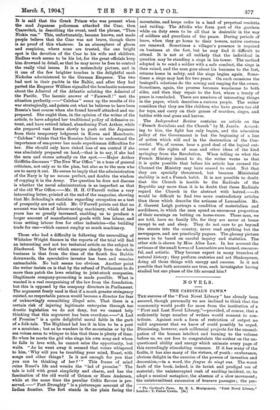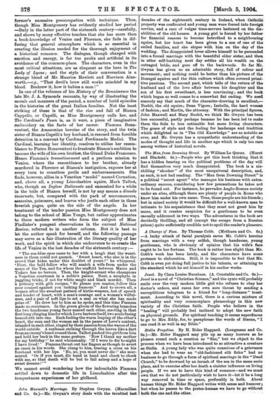THE success of the "First Novel Library" has already been.
assured, though personally we are inclined to think that the community would profit far more from the institution of a "First and Last Novel Library,"—provided, of course, that a sufficiently large number of writers would consent to con- tribute. Against such a form of restriction of output no valid argument that we know of could possibly be urged. Dismissing, however, such millennial projects for the emanci- pation of the human intellect and turning to the volume before us, we are free to congratulate the author on the un- questioned ability and energy which animate every page of this exceedingly stimulating romance. If it has many of the faults, it has also many of the virtues, of youth : exuberance, obvious delight in the exercise of the powers of invention and decoration,—in a word, the fougue de vingt ans. The worst fault of the book, indeed, is its lavish and prodigal use of material; the uninterrupted rush of exciting incident, or, to adopt a musical metaphor, the absence of a slow movement; the unintermittent succession of bravura passages ; the per- * The Cardinal's Pawn. By K. L Montgomery. "First Novel Library.' London : T. Fisher Unwin. [Si.)
former's excessive preoccupation with technique. Thus, though Miss Montgomery has evidently studied her period —Italy in the latter part of the sixteenth century—carefully, and shows by many effective touches that she has more than a book-knowledge of Venice and Florence, she fails in dif- fusing that general atmosphere which is so essential in creating the illusion needed for the thorough enjoyment of a historical romance. The dialogue, though charged with emotion and energy, is far too prolix and artificial in its avoidance of the common-place. The characters, even in the
most critical situations, are as eloquent as the hero in The Lady of Lyons ; and the style of their conversation is a
strange blend of Mr. Maurice Hewlett and Harrison Ains- worth,—e.g., "That devil's brew still works mischief in my blood. Beshrew it, how it babies a man !"
In one of the volumes of his History of the Renaissance the late Mr. J. A. Symonds recounts, by way of illustrating the morals and manners of the period, a number of lurid episodes in the histories of the great Italian families. Not the least striking of these is that of the rise and fall of Bianca Cappello, or Capelli, as Miss Montgomery calls her, and The Cardinal's Pawn is, as it were, a piece of imaginative
embroidery on the facts of her career. Fiamma Bona- venturi, the Amazonian heroine of the story, and the twin sister of Bianca Capelli's boy husband, is rescued from forcible
detention in a convent by Cardinal Ferdinando Medici. The Cardinal, learning her identity, resolves to utilise her resem- blance to Pietro Bonaventuri to frustrate Bianca's ambition to become the wife of his own brother, the Grand Duke Francesco. Hence Fiamma's travestissement and a perilous mission to
Venice, where the resemblance to her brother, already murdered in Florence at Bianca's instigation, exposes her at every turn to countless perils and embarrassments. She finds, however, allies in a Venetian "model" named Carnation, and, above all, a young Lincolnshire squire, Mark Talbot,
who, though an Inglese lialianato and enmeshed for a while in the toils of Bianca herself, is not by any means a diavolo incarnato, but, compared with the pack of necromancers,
assassins, poisoners, and bravos who jostle each other in these feverish pages, quite on the side of the angels. In her
treatment of the tender passion Miss Montgomery does not belong to the school of Miss Yonge, but rather approximates to those modern writers who form the subject of Miss Findlater's pungent observations in the current National Review, referred to in another column. But it is best to let the author speak for herself, and the following passage
may serve as a fair illustration of the literary quality of her work, and the spirit in which she endeavours to re-create the life of Venice in the last decades of the sixteenth century :—
" The sea-blue eyes came to her with a laugh that the weari- ness in them could not quench. 'Sweet heart, who else is in the crowd that hides under this doublet of yours P' he whispered. 'First, the bold fellow who will snatch a wife from under the noses of the Ten, and for whom the scaffold between Marco and Todaro has no terrors. Then, the knight-errant who champions a Venetian courtesan in a noble's palace. Next, a neophyte in juggling tricks, if not for white magic and black murder. Then a poticary with glib recipes, "So please you master, follow this poor counsel against yon lurking humour." And to crown all, a woman after the sweetest pattern of kirtle-wearers, hot of speech and tender of heart, with a man's courage and a woman's wilful- ness, and a pair of soft lips to set a seal on what she has made prize of.' He drew her to him as he spoke, and this time Fiamma made no resistance. In the green gloom of the flowering branches the two handsome young faces neared each other, meeting in that first long clinging kiss for which Love barters itself, two souls fusing henceforth into one. Each feeling the warm leaping of the other's heart, the man and the woman sat in the pause of Love's content, islanded in each other, ringed by their passion from the waves of the world outside. A sunbeam striking through the leaves like a dart from an enemy's hand roused them. Talbot pushed the girl from him and held her back in the same gesture. 'Now I thank my mother for my birthday !' he said whimsically. `If I were to die to-night I have lived ! ' Fiamma thrust out her fingers as though to avert an omen in his words. She clung to him, tracing a cross on his forehead with her lips. No, no, you must never die !' she mur- mured. 'Or if you must, die hand in hand and cheek to cheek with me, so that death will be but to fall asleep and a hope of sweet dreams I "
We cannot avoid wondering how the indomitable Fiamma settled down to domestic life in Lincolnshire after the tempestuous experiences of her girlhood.











































 Previous page
Previous page